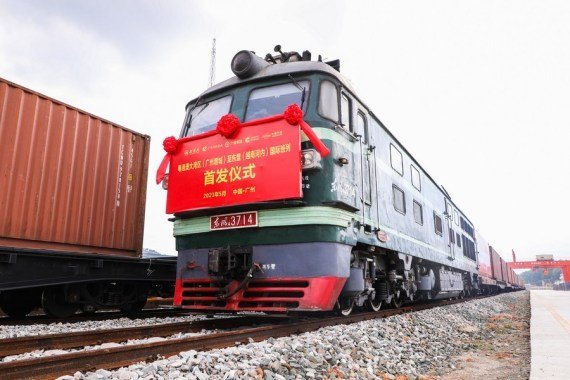The Guangdong-Hong Kong-Macao Greater Bay Area launched its first freight-train route to ASEAN countries on Tuesday.
A freight train loaded with goods worth about 94,400 U.S. dollars departed from Guangzhou, capital of south China’s Guangdong Province, on Tuesday. The train will take about four days to reach its destination, the Vietnamese capital Hanoi.
Sinotrans Ltd., the logistics division of China Merchants Group (CMG) and one of the route’s operators, regards the international freight-train service as an important channel to ensure the smooth operation of the global supply chain during the COVID-19 pandemic.
In 2020 alone, the company conducted 1,580 freight-train trips, carrying 157,000 twenty-foot equivalent units (TEU) of goods, with cargo volume up 23 per cent, according to Sinotrans.
As the first freight route between the two regions, the new service is also expected to boost the high-quality development of countries and regions along the Belt and Road, the company said.
Sinotrans, has last year established its own rail link between Shenzhen and Duisburg, Germany offering a new connection for freight transport between the Pearl River Delta and Europe.
The service will travel from China through Kazakhstan, Russia, Belarus, Poland and then Duisburg in Germany.
Guanpeng Li, CEO of Sinotrans, said: “Shenzhen together with the Greater Bay Area (Pearl River Delta) is one of the most successful economic regions in China. Duisburg is a transport hub for multiple transport carriers in Europe.
“The opening of the “Bay Area” plays a crucial role in securing continuous supply chains between China and Europe and promoting even closer economic contacts.”
Erich Staake, CEO of duisport, stated: “After connecting Jinan in north-east China and Changsha in central China to our network in the spring, we have turned our attention to increasing the services for the Pearl River Delta. This strategic partnership strengthens our network.”
Since the first China-Europe freight train left southwest China’s Chongqing Municipality in March 2011, China has launched the service in over 60 cities domestically connecting them with major European countries.






Click here to change your cookie preferences